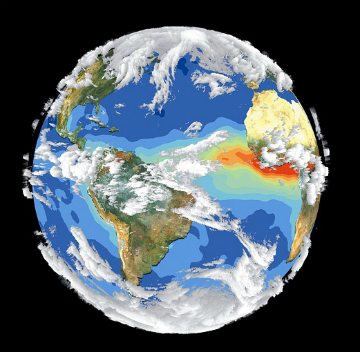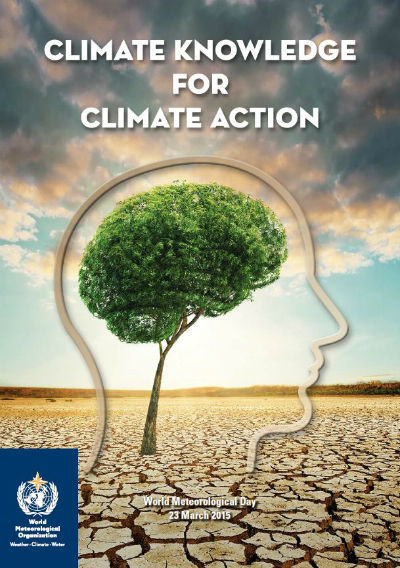World Meteorological Day 2015
 The United Nations' (UN) World Meteorological Day is annually held on or around 23 March to commemorate the launch of the World Meteorological Organisation (WMO) in 1950.
The United Nations' (UN) World Meteorological Day is annually held on or around 23 March to commemorate the launch of the World Meteorological Organisation (WMO) in 1950.
The theme for 2015 World Meteorological Day is Climate knowledge for climate action, a theme which focuses on current climate research to help us make changes to help fight global warming.
In 2013 Minister of Environmental Affairs and Development Planning Anton Bredell said “climate change is a reality and we would be irresponsible not to take action to reduce our impacts on and improve our resilience to the impacts of this phenomenon.” The following year the revised Western Cape Provincial Climate Change Response Strategy was launched, which identified agriculture as a high priority.
Climate in the Western Cape
Because it is a winter rainfall area, the Western Cape is especially vulnerable to climate change. Experts predict the region will get warmer and drier, with longer periods between increasingly intense rainfall. This is particularly concerning for our already water-stressed province.
In addition to this, the Western Cape is a coastal province, with a coastline spanning approximately 900km, leaving it vulnerable to storm surges and rising sea levels. For a province that is characterised by a service-based economy, coastal vulnerability poses a significant risk to tourism, coastal properties and infrastructure, and fisheries-based industries.
While the science of climate change progresses every year, a great deal is also being learned about how to help leaders understand and apply climate knowledge. This enables weather providers and climate experts to develop and offer customised information for a wide range of users.
According to Dr Andries Kruger of the South African Weather Service (SAWS) 'knowledge of our climate and probable future climate, has become increasingly important for forward planning in the various socio-economic sectors.' Weather forecasts help farmers, emergency workers and other decision makers in weather-sensitive sectors to schedule their daily and weekly duties and priorities. 'For example, research needs to be conducted to determine how a changing future climate will affect agriculture, through warming, extremes and changing rainfall patterns, and health, where the occurrence of heat waves can severely affect the health of the elderly and younger members of society,' Kruger said.
Thus, when our communities become empowered by weather and climate knowledge, local, provincial and national leaders will have more confidence in their ability to tackle climate change. It will also help them reduce the risks of disasters caused by climate change.
Acting now to fight the effects of climate change can:
- save lives
- protect livelihoods
- secure property
- reduce negative impacts
5 things you can do to help fight climate change
- Reduce energy use

Adopt energy-saving habits. Make it a habit to turn off the lights as you leave a room. Replace standard light bulbs with energy-efficient compact fluorescent bulbs.
- Change the way you think about transportation
Take public transit or carpool whenever possible. When purchasing a vehicle look for one that is light on fuel, or consider a hybrid or electric vehicle. Increase your fuel economy when driving by sticking to the set speed limits.
- Make every drop count
Conserve water by fixing drips and leaks, and by installing low-flow shower heads and toilets. Turn off water while brushing teeth or shaving.
- Recycle
Recycling is easier than ever before, make it part of your daily routine. Recycle all packaging and consumer goods that you can. Aim to purchase items with recyclable packaging.
- Plant indigenous plants and trees
When gardening, select plants and trees that are well suited to your climate and require minimal watering and attention.
Today we have more weather and climate knowledge than ever before, so ignorance is no longer an excuse for not taking steps to minimise climate risks. Professor Hannes Rautenbach feels that 'knowledge of the response of weather systems on changes in climate will ensure that we become more responsible citizens' and ultimately effective climate action can ensure our current and future well-being.
Related:
- Smart agriculture for climate resilience (SmartAgri) project
- A landowner’s guide to managing climate change
- Climate-smart agriculture, forestry and fisheries (CSA)
- Western Cape sustainable energy projects database
- 2012 Western Cape energy consumption and carbon dioxide emissions database reports
- Framework for adaptation to climate change in the City of Cape Town
- Global framework for climate services (GFCS)
- National climate change response website
- National climate change response white paper



